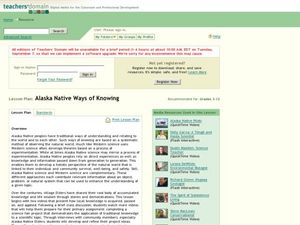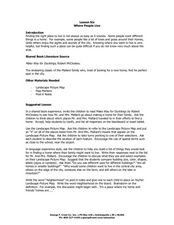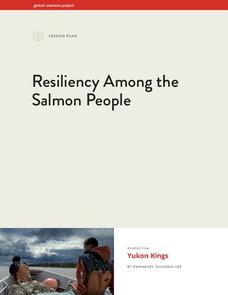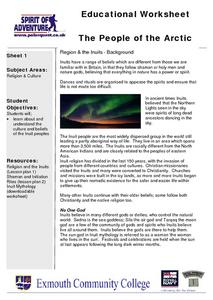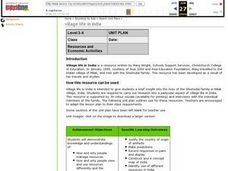EngageNY
Using Quotes to Explain Relationships: How the Invention of Television Changed People’s Lives
Television changes the world. Scholars determine the gist of the video clip Television Takes the World by Storm and article How Do
Inventions Affect the Way We Live? They then do a second view and read to complete an Explanation Task...
Curated OER
What in Our World Affects the Way People Live
Sixth graders study various maps that show geographical features and population. They compare the maps and make inferences about how various geographical features influence the population and human activities of an area.
National Museum of the American Indian
The Kwakwaka'Wakw: A Study of a North Pacific Coast People and the Potlatch
Discover the cultural practices and unique value systems of a group of native peoples from Canada called the Kwakwaka'wakw. Your young historians will discuss how conceptions of wealth can vary and how these native people utilized...
Curated OER
Alaska Native Ways of Knowing
Pupils watch a video on the Alaskan native ways. They examine how knowledge was passed down from elders and how the Alaskans lived with harmony in nature. Learners then prepare and present a classroom science fair project based on their...
Curated OER
Lesson Six Where People Live
Students investigate where people live. In this early geography lesson, students read Make Way for Ducklings! by Robert McCloskey and then discuss what neighborhoods are as they identify them on landscape picture maps.
Global Oneness Project
Resiliency Among the Salmon People
Is losing cultural traditions the cost of social progress, or should people make stronger efforts to preserve these traditions? High schoolers watch a short film about the native Yup'ik people in Alaska and how they handle the shifts in...
New York City Department of Education
Geography and Early Peoples of the Western Hemisphere
Young historians discover the early people of the western hemisphere. The unit explores how the land changed, how it was used and homes of early Americans such as Incas, Mayans, Inuits, Aztecs, and Pueblos. Individuals also examine these...
Curated OER
Six Ways to Effectively Use Classroom Volunteers
Parents are often an untapped resource, offer them a variety of ways to help in your classroom.
Curated OER
People of the Arctic
Read to learn all about the religion and belief systems of the Arctic-dwelling Inuits. This resource includes an easy-to-follow reading passage that is seven paragraphs in length, and five great critical thinking questions.
Curated OER
Landforms Mobile
Students work together in groups to research the various types of landforms found on the Earth and locate them on a map. As a class, they discuss how the landforms affect the way people live in those areas. To end the lesson, they use...
National Endowment for the Humanities
People and Places in the North and South
North and South: two opposite directions and two opposite economic and social systems in time of the Civil War. Pupils peruse census websites and primary source photographs to understand what life was like for the everyday person before...
Inclement Weather and Its Effect on People
Using http://www.ready.gov/kids/know-the-facts students will read about four different types of emergencies and what to do before, during and after. After reading, students must decide how each could impact the lives of the people,...
Equality and Human Rights Commission
Taking Action
The Universal Declaration of Human Rights passed in 1948 when the majority of members of the United Nations voted in favor of the resolution. Scholars use their knowledge of human rights to determine ways they personally can help promote...
Curated OER
Three-Level Reading Guide- The Apaches: People of the Southwest
A reading guide designed for Jennifer Fleischner's nonfiction text, The Apaches: People of the Southwest, provides readers with three levels of comprehension questions meant to encourage higher-level thinking.
Curated OER
I've Felt the Same Way
Students recognize various differences between their lives and the lives of
people living in the 19th century Chicago area. They hear stories from people living in four different historical time periods and match the stories
to their...
Curated OER
Water Uses and Children's Lives in East Africa
Students explore water usage around the world. In this "water" social studies lesson, students brainstorm ways in which water is used. Students visit the Water in Africa website to view pictures of water usage in Africa. Students...
Atlanta History Center
What if YOU Lived During Jim Crow?
Young historians envision what life was like for African Americans living in the Jim Crow South through hands-on, experiential activities.
US National Archives
The Home Front: How Did People Prepare for the War at Home?
Wars have a profound effect not only on a country's soldiers, but also on the everyday lives of its citizens. Invite young historians to discover how Britain prepared for the second World War by analyzing a series of government posters...
Reed Novel Studies
The Doll People Novel Study
Make believe becomes a reality in The Doll People by Ann M. Martin and Laura Godwin. Readers answer worksheet comprehension questions about the seven dolls living in the house and examine the advantages and disadvantages of living life...
Curated OER
Charity throughout History
Ever stop to think about why charities exist and when they started? Take a second to look through history and discover that giving has been apart of human society since ancient Rome. Jump to the US to uncover facts about our first...
Curated OER
Village Life in India
Students use included links to research the lives of people living in a small village in India.
Curated OER
We the People: A Study in American Voter Turnout: US Government
Students examine and compare voter turnout in US Elections. They write a letter to a favorite candidate or representative suggesting ways to increase voter turnout.
Arizona Department of Education
Be Independent / Life Management Skills
Living independently is about more than managing money. Learn how to manage time, balance responsibilities, and calculate overtime and income with a set of activities about life management skills.
Howard Hughes Medical Institute
Understanding Variation
Does where we live influence how our bodies express genetic traits? Explore variation in human skin color with an activity that incorporate video and hands-on learning. Individuals model the relationship between phenotypes and genotypes,...





